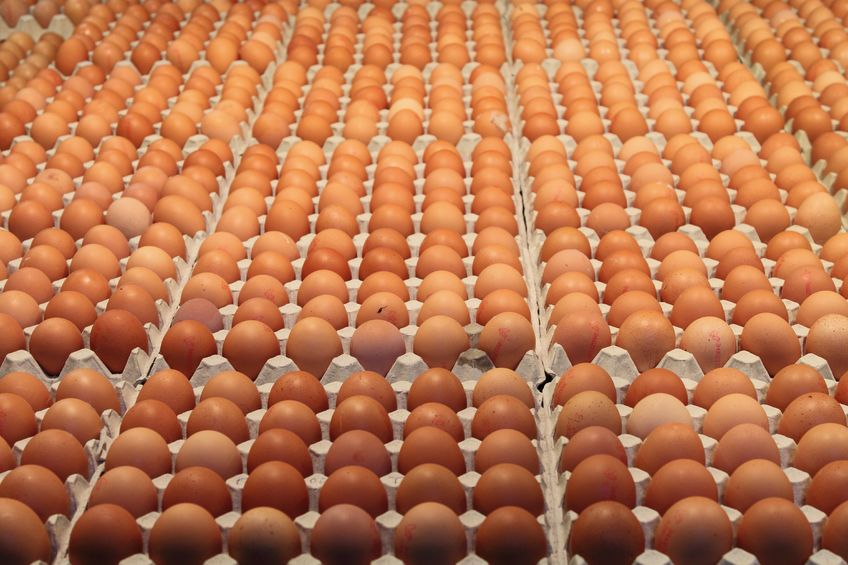
Noble Foods is cutting the price it pays producers for medium and small eggs - but increasing the price for large and very large.
Demand for large eggs amongst consumers has surged, exacerbating problems in moving other grades of egg.
Earlier this year, Andy Crossland of Central Egg Agency said that retailers seemed to almost have an "obsession with large eggs."
He said: "Retailers are looking far too much for large eggs. We are producing far more medium than large eggs, but selling more large than medium. The industry needs to be putting pressure on retailers because it is an issue." Packing companies agreed that this was a problem.
Noble Foods has reacted to this in new changes to its producer prices. It has written to its producers to say that from November 3 the price paid for large and very large eggs would be increased by two pence per dozen.
"As mentioned in our producer bulletin back in September, the current trend in the free range egg market is now showing a dramatic swing towards large eggs at the expense of mediums," said agriculture director, Graham Atkinson in the letter to producers.
"The resultant medium egg surplus is generally traded on the wholesale market or sent to processing, both routes resulting in lower returns not only for medium grade but also for small grade and second quality eggs, which already trade in the processing market. This, in turn, results in substantial losses against the price paid to yourself," he said.
Larger eggs
Andy Crossland has said that he has had difficulty moving small and medium grade eggs. During the summer, Stonegate said that consumers were moving to larger eggs, as it announced that the price for standard medium free range eggs were being reduced by 10 pence.
Noble has told its producers that its medium egg prices are being reduced by seven pence per dozen. The new price for small eggs will be 22 pence per dozen, inclusive of any bonus.
This is down from an inclusive price of 33 pence per dozen. The amended price for graded seconds is 10 pence per dozen inclusive - down from 14 pence - and the new price for farm seconds is 15 pence per dozen inclusive -down from 21 pence per dozen.
Graham Atkinson says in his letter to producers: "Your current flock age and egg size profile will, of course, have effect on the cost impact of these changes, but we must endeavour to align supply and demand by size as soon as possible and reduce the surplus which has the greatest negative influence on price."
'Unsustainable'
At the annual conference of the British Free Range Egg Producers Association (BFREPA) in October, chief executive Robert Gooch warned that, whilst demand for free range eggs was growing at three or four per cent each year, supplies were increasing by 10 per cent, as new producers moved into the industry and existing producers expanded their units. He said this was unsustainable.
"At the beginning of this year free range became the dominant production system for the first time. That means we are now mainstream," he said at the conference.
"We are not a niche product any more. We need to accept as a sector that we are no longer niche and that we can't continue to expand and expand and expand. We are now a mature sector and the dominant production system.
"We have been expanding at 10 per cent a year for the last three years, two million free range hens going down every year for the last three years," he told those attending the conference.
"It has led us to the position we are in now where price is under significant pressure because of over-production."
Big is not always best
Some leading figures in the egg industry have suggested that consumers need to be persuaded that big is not necessarily best when it comes to buying eggs.
But in his letter to producers, Graham Atkinson calls on them to increase production of larger eggs if possible to try to meet the demand of the market.
"Some of you may be in a position, dependant on bird age, to improve egg size from your flock without negatively impacting other performance and welfare parameters, and, as ever, your regional manager in conjunction with your feed representative will be happy to help and advise on how this may be achieved."
During the BFREPA conference, John Kirkpatrick, Tesco agricultural manager for poultry, eggs and feed, warned about the consequences of oversupply in the egg market. He said everyone had a responsibility in dealing with the supply of eggs.
"We are all part of the supply chain, retailers, farmers, bank managers, farming consultants. I think the key thing from our perspective is everybody sat in this room is part of the supply chain," he said.
"I think we've got to recognise that and work together to make sure we don't create situations whereby we have got all this egg on the market - we actually manage it better.
Mr Kirkpatrick added: "We have got to wake up and smell the coffee, here. There is nobody forcing people to put up chicken houses. People out there are doing this of their own volition."
BFREPA has warned that a tough summer has already resulted in farm gate prices of free range eggs falling because of oversupply. At the same time drought conditions have increased feed bills by 50 per cent for some producers, it says.
